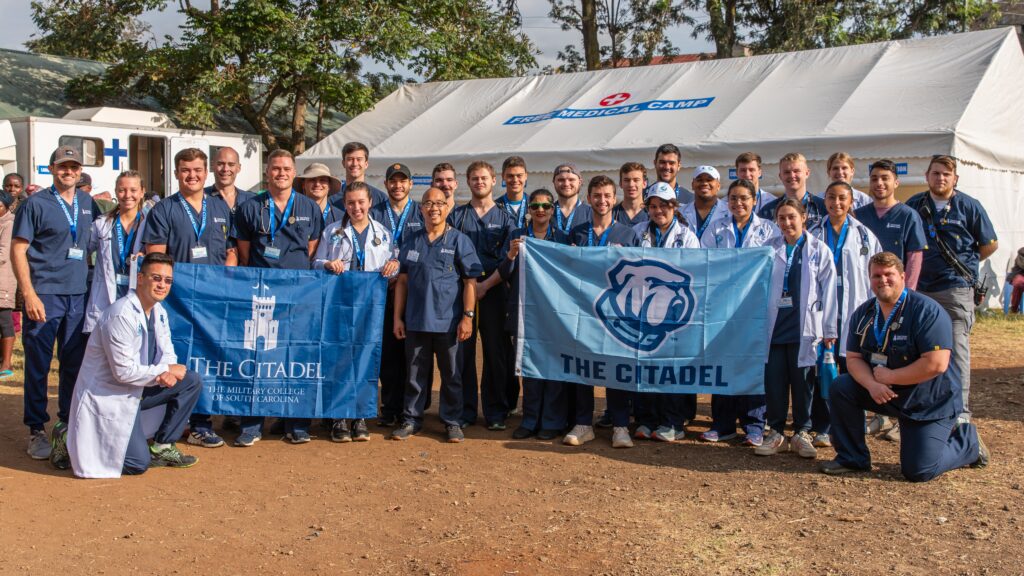
Photo: Citadel cadets and students at the medical camp in Kenya, a service opportunity offered to those in the pre-health program.
Advising at The Citadel is an important part of every cadet and student’s academic journey. For one group of academic advisors on campus, advising has been an integral part of their program for years as they support the next generation of healthcare professionals.
The pre-health advising program at The Citadel provides extensive support and resources to cadets and students who are preparing to apply to all types of health related program. Some of these resources include pre-professional clubs, service opportunities, personal advising, access to enrichment activities, a summer study abroad and service trip and a mentorship program.
Kathy Zanin, Ph.D., the pre-health advisor at The Citadel, took over the role in 2011. Since then, the program has grown exponentially. Currently, pre-health advising is shared between four professors: Zanin, Patrice Capers, Ph.D., Sarah Imam, M.D., and Kimbo Yee, Ph.D. Their roles are all-encompassing, from helping their students learn about the different options in health care careers to preparing them for their medical school interviews.
The Citadel’s pre-health advisors are well informed on every single health profession available, as well as the academic requirements to pursue those careers. They must be, to ensure their students can have the best advantage possible when applying to medical schools.
“What we see on websites and official information is very brief, just the basic requirements, but that does not mean that you’ll be accepted into the program. As advisors, our role is to be as knowledgeable as possible, so then we can truly help all of the students,” said Imam.
Another important component of pre-health advising at The Citadel is the mentorship program. Zanin currently runs this program, which connects a group of Citadel alumni volunteers with pre-health students, allowing for mentorship through shadowing or just giving general advice. It’s another way that Citadel cadets and students are connected to distinguished alumni who have experienced success in a similar field. Between five to ten students are connected to a mentor in an academic year, according to Zanin.
The Pre-Health Society is also a great option for Citadel cadets and students interested in pursuing careers in the medical field. Meetings can include presentations from representatives of medical schools, dental schools, pharmacy schools, public health schools and others. Students who have participated in health-related internships can also give presentations.
“We host meetings once a month, sometimes more and sometimes less, to help students learn what different options are available in terms of health careers or what the expectations are if you want to go to dental school versus medical school, when to apply, how to apply and more,” said Zanin. “We’ve done all kinds of different things over the years at those meetings. So those are good enrichment opportunities for students to learn what it takes to be competitive.”
In addition to the Pre-Health Society, The Citadel also has the Alpha Epsilon Delta Honor Society, or AED. While AED also helps students prepare for interviews and shares other similarities with the Pre-Health Society, their primary focus is on community service activities and volunteering. One of these service efforts is the Feed a Friend Friday Program, which helps feed those who are homeless.
“This is a fantastic experience for our students because it’s not just service, it also teaches them to respect everyone, which I hope students can bring into healthcare. You need to be able to work with people from all walks of life, be able to respect all patients, and it’s with these experiences that they learn that, which is really important,” said Imam.
Pre-health students at The Citadel are also offered a unique study abroad opportunity during the summer — running a medical camp in Kenya, which is the largest, free general medicine provider in Nairobi. The camp first opened in 2022, and the cadets and students who have volunteered have treated nearly 11,000 patients while receiving hands-on experience. Imam says cadets and students who were involved in the Kenya program have an edge over other candidates. As an added bragging point for this group, Citadel cadets and students were recently recognized by the mayor of Charleston for their work.
“The Kenya program is one of a kind. When our students get to the point of getting an interview, the bulk of the interview is often about the Kenya program because everyone’s fascinated as to what they did and what they learned,” commented Imam.
For guidelines on advising, Imam looked to the highest professional organization in the medical field — the American Association of Medical Colleges.
“The American Association of Medical Colleges, or AAMC, is the governing body. All medical schools and all the other health professions follow the rules that AAMC conveys. AAMC has a set of 15 competencies, and those competencies are what they want to see within students that are applying and what they want medical schools to assess. That has trickled into all of the other health professions. So, I started off with that, and as I go through them, I ask what we are doing for our students to ensure they have all these competencies,” said Imam. “One of the hardest ones is cultural competency. How do you demonstrate that? How do you share that? So, that’s why we have programs like Feed a Friend Friday, why we have the Kenya study abroad program — we want to ensure our students are above and beyond any competitor.”
The Citadel’s pre-health advising program also offers a Pre-health Professions Committee. This committee is comprised of professors from departments across campus where most pre-medical and pre-dental students come from, such as chemistry, biology and exercise science.
“Basically, what our committee does is collect the individual letters of recommendation from the students’ individual professors, maybe doctors they’ve shadowed or community service leaders that they’ve worked with. We read those letters, and we look at the students’ leadership and academic transcripts. We consider all the enrichment activities and volunteer work that they’ve done, research they’ve done, and we also discuss what we know about them personally from having them in our classes. Then we decide on a level of recommendation from the Citadel Pre-Health Professions Committee. As chair of the committee, I write the committee letter on behalf of my colleagues on how we recommend each student based on their individual letters, but also based on everything else we know about them from being here at The Citadel. Then we submit that letter to the application service on behalf of the student, and as an appendix, we attach the individual letters that were written as well,” explained Zanin. “That process takes a lot of time and energy, but it gives the students a little bit of an advantage to be able to have a committee letter of recommendation, instead of just individual letters.”
Between the Pre-health Society, AED, the Kenya program, a mentorship program, the Pre-health Professions Committee and individual counseling, pre-health cadets and students at The Citadel are well prepared to pursue their post-undergraduate education and, eventually careers, in the medical field.
But Zanin and Imam both agree — the earlier the better when it comes to deciding to pursue a career in the medical field.
“Junior year is imperative. You have to apply to programs pretty much at the end of your junior year for the majority of them, so what that means is the more time the better in being able to get our students ready in order to be a position to apply at the end of their junior year,” stated Imam. “I think a lot of students don’t realize it’s a whole year, so the advising part is really important. You have to make yourself a good candidate, and I and the other advisors will help. We make sure that they have shadowing experience, volunteering experience and the ability to demonstrate their own research project.”
Zanin echoed that, saying that most students don’t realize the prerequisites needed for medical school, nor the time and preparation it takes for the MCAT, the medical college admission test.
This year, for the first time, The Citadel will hold an in-person summer Kaplan MCAP Prep Course for 25 Citadel cadets, students or alumni. Those interested should contact one of the pre-health advisors, listed here, to receive application information. All applications are due by Dec. 6.
“Most of our students go to in-state institutions, but let me tell you, that’s impressive enough. It’s extremely competitive to get into medical school. Only about 42% of applicants are accepted. That means 58% are rejected, and those 58% are good students. The problem is a lot of people can’t get in the first time they apply, so then they go on and get a master’s degree or they go to work in a hospital, or they do some impressive research and then they apply again,” said Zanin.
When asked about cadet and student success stories, both Zanin and Iman have trouble talking about them — not because there’s not one that comes to their minds, but because there are countless success stories, showing a true testament to the effectiveness of The Citadel’s pre-health advising program.
“We have collected tons of testimonials and success stories from our students over the years. I have emails, text messages and things like that, and all of the other advisors do too, that we have received from students telling us how grateful they are for the guidance we gave them, and for the opportunities we provided for them that helped them to be successful,” said Zanin.
The Citadel’s QEP, or Quality Enhancement Plan, is the college-wide plan for enhancing campus wide advising services. While pre-health advising is just one part of the institution’s QEP, these advisors are excited for everyone on campus to see the value in advising.
“What we are doing with pre-health advising directly aligns with the QEP, because we are ‘Advising Tomorrow’s Principled Leaders.’ We are trying to prepare people to get into the health care careers that they want, so that they can become leaders as healthcare providers,” said Zanin.
The Citadel provides extensive support and resources to pre-health cadets and students who are preparing to apply to medical, dental, veterinary, PA or PT school, or any other health-related program. The Citadel offers many majors that prepare cadets and students well, and they experience a very high acceptance rate to medical school, as compared with the national average.

 The Citadel’s presidential search committee announces four finalists
The Citadel’s presidential search committee announces four finalists Prestigious Cincinnati and MacArthur awards presented to Citadel cadets
Prestigious Cincinnati and MacArthur awards presented to Citadel cadets Looking ahead to the major events of 2026-27
Looking ahead to the major events of 2026-27

